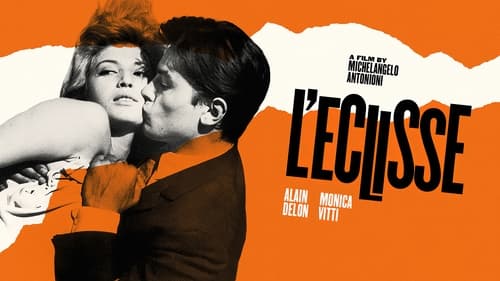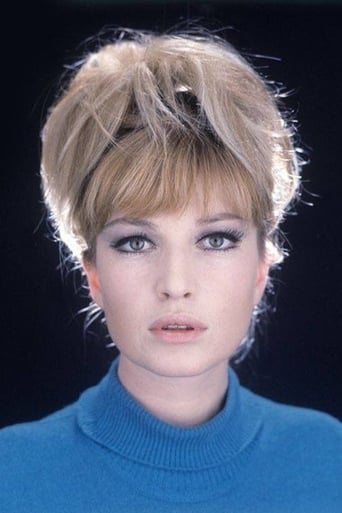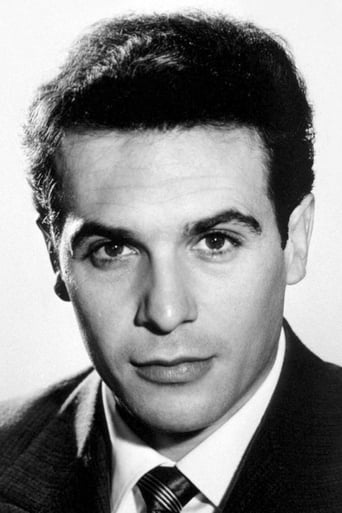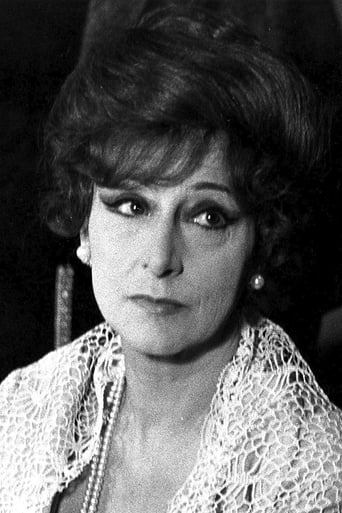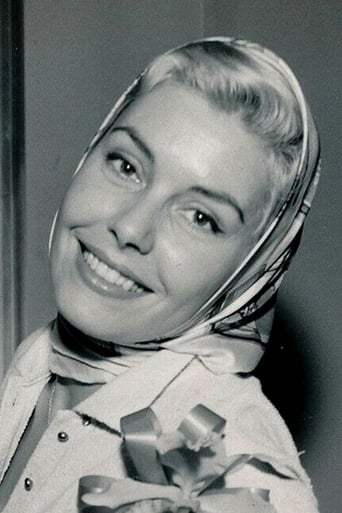Cubussoli
Very very predictable, including the post credit scene !!!
Vashirdfel
Simply A Masterpiece
Ceticultsot
Beautiful, moving film.
Freeman
This film is so real. It treats its characters with so much care and sensitivity.
elvircorhodzic
L'ECLISSE is a romantic drama about an alienation, life's riddles and relationships.Vittoria, a young literary translator, breaks off her relationship with her boyfriend, an older writer, in his apartment, following a long night of conversation. Sometime later, she visits her mother at the frantic Rome Stock Exchange, which is very busy upon Vittoria's entrance. She meets a young and energetic stockbroker. He is her mother's stock broker. Vittoria attempts to discuss her own recent breakup, but her mother is preoccupied with her earned profits. However, she is impressed with a young stockbroker, his character, outlook and business...Mr. Antonioni has continued his tradition. His vague and abstract pictures are a reflection of human relations and interests. The protagonists are sad, confused and somewhat lifeless. This is not a story about an unhappy or elusive love. This is a story about the needs and emotions in a material world. Mr. Antonioni has made a contrast between the inner moods of a woman and intimidating behavior of a group of people who run for the money. His unconventional narrative reveals a naked truth, especially in final scenes.The characters are lost and vague.Monica Vitti as Vittoria is a timid and suspicious young woman, who sees the pieces of greed and lust in the people around her. Due to her lack of confidence and self introversion, she is trying to establish an abstract relationship with objects. Alain Delon as Piero is a young beauty from a material world. He, unconsciously, complements Vittorias nature. However, his relaxed approach, in terms of love, has a negative effect on her.The last scenes are a kind of projection of a material life, in which a normal existence is not possible.
Di_Giorgio
"I was 15 when I first saw Antonioni's L'eclisse. It was screened for only one afternoon at the Tooting Classic. I skipped school games to go and see it and as a result got slapped into a two-hour detention. The impact the film had on me in 1963 was devastating. It was unlike anything else I had seen, and it seemed to describe the kind of world into which we were moving - it was almost science fiction.L'eclisse was made some months before the Cuban missile crisis and my memories of it are strongly liked to that terrifying week of nuclear brinkmanship. I think that a premonition of a looming, unidentifiable catastrophe was what made the movie so disturbing.It is difficult to communicate just how frightening that October in 1962 was at the time. We all lived under the threat of obliteration, the end of everything, fine. Subsequent international crisis no longer felt so remote, each one could take the world to the brink again, and this time some maniac might press the button.Antonioni's film was the first I saw that seemed to be made with acute awareness that the old myths, however comforting, were no longer adequate. It eschewed all certainties of characterisation, dramatic intent and narrative resolution. It was altogether a different sort of movie - it felt 'modern', its very fabric disturbed by an uncertainty that could now be said to underlie everything.This is not to reduce L'eclisse to being 'about' the nuclear threat (although a newspaper headline 'The Atomic Age' appears as part of a montage during the film's climax, and is especially unsettling). Trying to describe what the film - or any other work by Antonioni - is about, is not a simple task as it can't be reduced to a plot synopsis, although it is definitely preoccupied with the narrative space between events, actions and intentional dialogue.The opening scene is a long sequence set in an apartment showing two lovers, Vittoria (Monica Vitti) and Riccardo (Francisco Rabal), at the end of a love affair. Worn out from talking all night and past the point of having anything further to say, they are unable to make the definite break.Most films, I believe, would shoot the action prior to this - the night itself - but Antonioni is a director who focuses on what the films leave out. Much of this scene is without dialogue. As it progresses, we increasingly become aware of an electric fan and, later, a razor. These objects, which in other movies would provide background noise, become, under Antonioni's direction, extraordinarily highlighted.He is one of the most sensitive filmmakers to the use of sound; aircraft propellers, car engines, ringing telephones, opening and closing of doors, footsteps on stone floors, all carry weight, not for any pointed narrative purpose, but as evidence of the technologies we communicate with, the machines we travel in, the cities we inhabit and adapt to.There is a story in L'eclisse, but its emphases are elsewhere than usual. Monica Vitti leaves the apartment and begins a walk that lasts, in a way, for the majority of the film. Her journey is without any particular destination, a series of detours, explorations and, most importantly, distractions. These distractions are the substance of the story and include a brief relationship with Alain Delon.A characteristic Antonioni sequence is the flight in a small four-seater plane from Rome to Verona during which we listen in to a virtually inaudible conversation. Nothing happens in the conventional sense: the journey, which takes considerable film time, appears to have no dramatic content. As with Vitti's character, the film has a wandering, searching quality. Antonioni has been described as 'the poet of alienation', and this is shown by Vittoria's detachment from the world - which may be interpreted as either a sign of health or equally of neurosis.There are two sequences, both set in the Borsa (the Rome stock exchange), which constitute the hub of the film. This is the world inhabited by Alain Delon's character Piero, a young stockbroker. It is observed with an anthropological eye for detail. Only in the stock exchange are people shown to be full of passion, energy and action; it is an emphatically male world, preoccupied with money, profit and deals, and one in which Delon is comfortable.Duration is an important component of Antonioni's style (the park in Blowup, the desert in Zabriskie Point, the rocky island in L'avventura, the space outside the hotel at the end of The Passenger). He films the Borsa with relentless curiosity, as if to say, 'look long enough and perhaps this place may reveal something of itself.'If the narrative finds its organisation around the brief affair between Delon and Vitti, it is something of a shock when both characters simply slip out of the film altogether. The final time the couple are seen together, they make arrangement to meet on a street corner. Neither one turns up, but the camera does. For a full seven minutes it records the world that carries on without them. Passers-by, seen in earlier scenes, take their regular walks; buses pull up, stop, drop passengers and drive on. Twice a person who might be Monica Vitti or Alain Delon turns out to be someone else. The streets empty and darken as day turns to dusk.This is an extraordinary sequence, acknowledging that it has lost both the original characters and the narrative. Other lives, which we know nothing about, cross the screen and disappear, leaving in the end just the city - functioning, automatically, part of a vast man-made machinery, within which individuals find temporary escape and pleasure in passing sensations of motion and contact. It is a chilling viewpoint."Ron Peck, Sight & Sound, December 1994
Sindre Kaspersen
Italian screenwriter, film editor and director Michelangelo Antonioni's eight feature film which he co-wrote with his frequent collaborator Tonino Guerra, Italian screenwriter and poet Elio Bartolini (1922-2006) and Italian sociologist and writer Ottiero Ottieri (1924-2002), is the third part of his trilogy of stylistically similar films and was preceded by "L'Avventura" (1960) and "La Notte" (1961). It was screened In competition at the 15th Cannes Film Festival in 1962, was shot on locations in Rome, Lazio and Verona in Italy and is an Italy-France co-production which was produced by Egyptian-born producers Raymond Hakim (1908-1980) and Robert Hakim (1907-1992). It tells the story about Vittoria, a young literary translator who ends her relationship with a writer named Riccardo. While trying to tell her mother, who is not paying attention, about her decision, Vittoria encounters a stockbroker named Pierro. Pierro takes a liking to Vittoria and all though recently having gotten out of a romantic relationship, Vittoria tries to evolve a relationship with him.Distinctly and precisely directed by Italian filmmaker Michelangelo Antonioni (1912-2007), this contemplative fictional tale which is set against the backdrop of the increasing economic growth in Italy during the early 1960s, draws an incisive and heartrending portrayal of a young man and a young woman's endeavour to establish a romantic relationship. While notable for it's naturalistic urban milieu depictions, the stellar production design by production designer and art director Piero Poletto, black-and-white cinematography by Italian cinematographer Gianni di Venanzo (1920-1966) and the fine editing by Italian film editor Eraldo Da Roma, this character-driven and dialog-driven drama which examines themes like interpersonal relations, interpersonal communication, alienation and love contains an efficient score by Italian 20th century composer Giovanni Fusco (1906-1968).This rhythmic, somewhat romantic and at times significantly atmospheric story where the distance between the characters and the violence within the frames and the use of light creates a poignant underlying tension, depicts a condensed study of character and is impelled and reinforced by it's fragmented narrative structure and the compelling acting performances by French-Swiss actor Alain Delon and Italian actress Monica Vitti. An eloquent and memorable modernist film which gained the Special Jury Prize at the 15th Cannes International Film Festival in 1962.
runamokprods
Physically beautiful, with an astounding last 5 minutes that elevates the film to another level. Like all Antonioni films, this might improve on 2nd viewing, but less obviously than with the better known L'Avventura. This story is less mysterious, less surreal, so there is less a sense that one is missing layers. A woman leaves her fiancé, falls for a young stockbroker, and we see that everyone cares more about money and 'things' than human relationships. The scenes in the stock exchange are amazingly shot, and every frame uses architecture and framing to underline the themes of alienation and the emptiness of modern life. Monica Vitti and Alain Delon make the two leads more human and real than earlier Antonioni main characters. But a number of scenes just feel clunky, even if beautiful, and some ideas seem overstated or over-repeated. That said, the experimental last five minutes, which puts the themes in a wider, more global context, is very moving and special. And to be fair many love this even more than I, though not in the the near universal embrace of L'Avventura. Note: The Criterion disc has some annoying flickering in the transfer, confirmed as a built-in problem after some on-line research.


